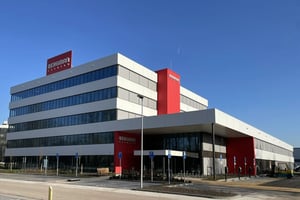The care sector is busy experimenting with self-managing teams and related concepts. Initially reactions were rather guarded: yet another management hype. Meanwhile these new working methods have gained ground in daily practice. Clients and professionals are enthusiastic.
"You have to hold one hand in front of your mouth and sit on the other", says Pieter de Kroon, owner at DeKroonPlus. The unusual posture described by De Kroon is the pose that a manager must adopt if he genuinely wants to offer care workers, clients and their families more freedom.
De Kroon has considerable experience in this respect. In his former job as CEO at Vanboeijen, an organisation for the mentally disabled, he developed the Management on Location (ROL) concept and introduced it to around a hundred teams. ROL is a Japanese Lean principles-based way of observing, thinking and acting, in which independently operating teams learn how to identify bottlenecks in their work, analyse them in-depth and subsequently solve them. For this pioneering work De Kroon was named Business Improvement Manager 2013 by the Dutch Network for Quality Management.
The emergence of self-managing teams in community care and ROL in care for the disabled is a response to the complaint that care workers are restricted by detailed regulations and managers that only lead with financial targets in mind. "The Taylorism system of distributing tasks as in a factory has gone too far in the care sector", observes Cris Zomerdijk, associate partner at Holland Consultancy Group. "Care professionals view this as distrust and are taking less and less pleasure in their work. Ever-more time is devoted to completing forms so that there is less time left for the patients. This leads to a high level of absence due to illness and a significant turnover in the care sector."
Zomerdijk should know: he is closely involved in introducing self-managing teams in the care sector and to other service providers. He also published the book De Ondernemende Professional on the subject. According to Zomerdijk, the result of this development is that care has become more expensive while the quality has not improved and has even fallen. "You can only break this trend if you dare to approach matters in a different way. Cosmetic changes, such as only affording workers a say about schedules, does not work." The care consultant is convinced that providing room for skilled labour and placing the relationship between client and professional central, produces better results. However: "Unfortunately in the care sector it involves much more than rules and procedures."
"You can only break the trend that care becomes more expensive while the quality has not improved if you dare to approach matters in a different way. Cosmetic changes, such as only affording workers a say about schedules, do not work."
Doing the right things
ROL's basic principles appear deceptively simple: more agreeable work, satisfied clients and a financially sound context. "I was also sceptical in the beginning. There are many management hypes", says De Kroon. "What is important is for a team to really have the opportunity to organise their own work. It involves cooperation between care workers, clients and their families within 'their' organisation."
As already mentioned, Vanboeijen applies the Lean concept here: not only to do things right but also (and only) to do the right things.De Kroon: "In all work activities the key question is: what is the added value for the client? This allows you to look at your daily activities in a different way. You ask yourself which work activities will lead to a better life for your clients. That is quite different from ticking off a checklist."
With the introduction of ROL, on the one hand the manager must keep his or her distance but must also create the conditions for the team to be able to work on its points for improvement. "It is not easy for managers. They are used to coming up with solutions. Preferably solutions that they can control", according to De Kroon.
He believes that ROL offers the major advantage that problems are not able to carry on simmering, but are addressed. "When there is a manager, team members expect their superior to solve the problem. You can also blame the boss if the problems persist. In the new situation you are forced to find a solution with colleagues and clients. Each time I am amazed at the solutions devised by the teams. A manager would never think of them."
Minibus
Mutual agreements that the teams make are more sustainable than measures imposed by management. "Horizontal management works better than vertical management", explains Zomerdijk. "You are more likely to accept something from a colleague that performs the same job than from a manager that sits in an office somewhere staring at spreadsheets. Colleagues are also more likely to talk to each other if something goes wrong."



.jpg?width=448&height=200&name=cybersecurity-privacy-protect-data%20(1).jpg)









